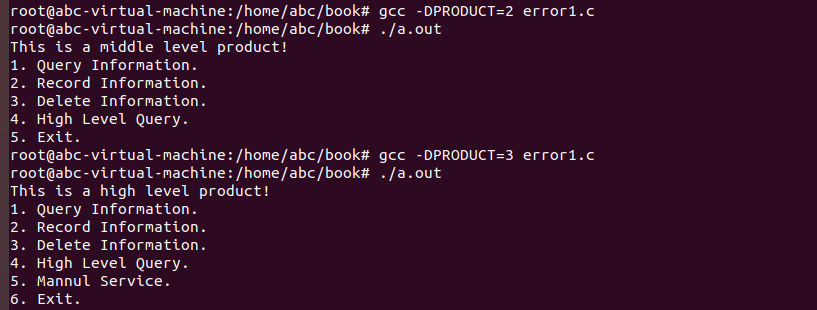虽然在语言里面用的比较少,但是还是有必要了解一下。
1.#error 用于生成一个编译错误消息
用法:bash#error message,message不需要用双引号包围
(1)#error是一种预编译器指示字
(2)#error可用于提示编译条件是否满足
(3)#error编译指示字用于自定义程序员特有的编译错误消息类似的,同理,#warning用于生成编译警告。
(4)编译过程中的任意错误信息意味着无法生成最终的可执行程序。
测试代码:
#include <stdio.h>
#ifndef __cplusplus
#error This file should be processed with C++ compiler.
#endif
class CppClass
{
private:
int m_value;
public:
CppClass()
{
}
~CppClass()
{
}
};
int main()
{
return 0;
}
我们使用gcc编译器去编译error.c文件,发生报错,我们使用#error的报错信息就会显示出来,原因在于里面其实是一个C++代码,所以我们使用g++编译器编译即可。

2.#error在条件编译中的使用
我们限制下面的文件进行输出的时候需要携带宏定义参数,如果没有就产生报错。
#include <stdio.h>
void f()
{
#if ( PRODUCT == 1 )
printf("This is a low level product!n");
#elif ( PRODUCT == 2 )
printf("This is a middle level product!n");
#elif ( PRODUCT == 3 )
printf("This is a high level product!n");
#else
#error The PRODUCT is not defined!
#endif
}
int main()
{
f();
printf("1. Query Information.n");
printf("2. Record Information.n");
printf("3. Delete Information.n");
#if ( PRODUCT == 1 )
printf("4. Exit.n");
#elif ( PRODUCT == 2 )
printf("4. High Level Query.n");
printf("5. Exit.n");
#elif ( PRODUCT == 3 )
printf("4. High Level Query.n");
printf("5. Mannul Service.n");
printf("6. Exit.n");
#else
#error The PRODUCT is not defined!
#endif
return 0;
}
不带参数的输出结果:提示我们自定义的错误信息

带参数的输出结果:

我们也可以把error换成警告,如果没有按照我们的要求进行编译,那么也会输出报警信息。
3.line的用法
(1)#line 用于强制指定新的行号和编译文件名,并对源程序的代码重新编号。
用法:#line number filename,filename可省略
注意:现在line基本没用了
#line编译指示字的本质是重定义__LINE_和__FILE__
测试代码:test.c
#include <stdio.h>
#line 1 "new.c"
int main()
{
printf("hello world!rn")
return 0;//8
}
运行如上程序,line执行完之后,会将line 1所在行的下一行为第一行输出打印,并且将输出的文件名从test.c改为new.c。

继续修改代码
#include <stdio.h>
int main()
{
printf("%s : %d rn",__FILE__,__LINE__);
#line 1 "HELLO.c"
printf("%s : %d rn",__FILE__,__LINE__);
return 0;
}
运行,结果如下,输出的文件名和行号确实被修改了。

以前的工程,往往是用下面这种办法来分辨谁写的代码,但是现在已经不怎么用了。
#include <stdio.h>
// The code section is written by A.
// Begin
#line 1 "a.c"
// End
// The code section is written by B.
// Begin
#line 1 "b.c"
// End
// The code section is written by Delphi.
// Begin
#line 1 "delphi_tang.c"
int main()
{
printf("%s : %dn", __FILE__, __LINE__);
printf("%s : %dn", __FILE__, __LINE__);
return 0;
}
// End
4.小结
(1)#error 用于自定义一条编译错误信息
(2)#warning 用于自定义一条编译警告信息
(3)#error和#warning常应用于条件编译的情形
(4)#line 用于强制指定新的行号和编译文件名
最后
以上就是碧蓝母鸡最近收集整理的关于C语言#error和#line的全部内容,更多相关C语言#error和#line内容请搜索靠谱客的其他文章。








发表评论 取消回复